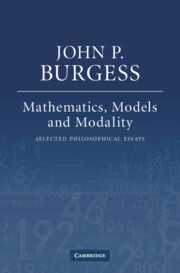Introduction
Published online by Cambridge University Press: 22 September 2009
Summary
ABOUT “REALISM”
A word on terminology may be useful at the outset, since it is pertinent to many of the papers in this collection, beginning with the very first. The label “realism” is used in two very different ways in two very different debates in contemporary philosophy of mathematics. For nominalists, “realism” means acceptance that there exist entities, for instance natural or rational or real numbers, that lack spatiotemporal location and do not causally interact with us. For neo-intuitionists, “realism” means acceptance that statements such as the twin primes conjecture may be true independently of any human ability to verify them. For the former the question of “realism” is ontological, for the latter it is semantico-epistemological. Since the concerns of nominalists and of neo-intuitionists are orthogonal, the double usage of “realism” affords ample opportunity for confusion.
The arch-nominalists Charles Chihara and Hartry Field, for instance, are anti-intuitionists and “realists” in the neo-intuitionists' sense. They do not believe there are any unverifiable truths about numbers, since they do not believe there are any numbers for unverifiable truths to be about. But they do believe that the facts about the possible production of linguistic expressions, or about proportionalities among physical quantities, which in their reconstructions replace facts about numbers, can obtain independently of any ability of ours to verify that they do so.
Information
- Type
- Chapter
- Information
- Mathematics, Models, and ModalitySelected Philosophical Essays, pp. 1 - 20Publisher: Cambridge University PressPrint publication year: 2008
